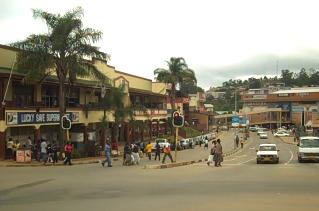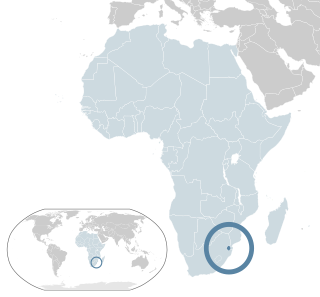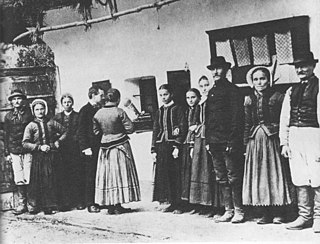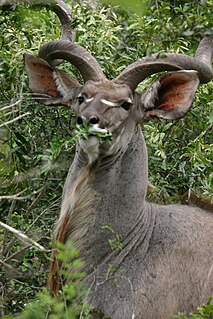
Eswatini, officially the Kingdom of Eswatini and also known as Swaziland, is a landlocked country in Southern Africa. It is bordered by Mozambique to its northeast and South Africa to its north, west and south. At no more than 200 kilometres (120 mi) north to south and 130 kilometres (81 mi) east to west, Eswatini is one of the smallest countries in Africa; despite this, its climate and topography are diverse, ranging from a cool and mountainous highveld to a hot and dry lowveld.
The economy of Eswatini is fairly diversified, with agriculture, forestry and mining accounting for about 13 percent of GDP, manufacturing representing 37 percent of GDP and services – with government services in the lead – constituting 50 percent of GDP.

Mbabane is the capital and largest city in Eswatini. With an estimated population of 94,874 (2010), it is located on the Mbabane River and its tributary the Polinjane River in the Mdzimba Mountains. It is located in the Hhohho Region, of which it is also the capital. The average elevation of the city is 1243 meters. It lies on the MR3 road.
Swazi culture is the way of life and customs of the Swazi people through various historical stages. The culture of Swazi people involves music, food, religion, architecture, and kinship, among many other things. The Swazi people are composed of various Nguni clans who speak the Nguni language SiSwati. These people mostly reside in Eswatini and South Africa. Presently, Swazi people may also include citizens of Eswatini. In Eswatini, one of the most visible features of cultural identity is the traditional political structure of the nation and the home. In the national level, the Ngwenyama is considered the head of the nation alongside the Ndlovukati who is the spiritual leader of the nation. National cultural events often involve the Ngwenyama or Ndlovukati. At home, the patriarch of the family is the head and in the past, often practiced polygamy. This headman, usually referred to as umnumzane is central to all activities of the home. A group of homes forming a community and the land they reside on forms a chiefdom or umphakatsi. Several chiefdoms form an inkhundla which then belongs of a regional division of the country. This connects the older traditional leadership structures to more modern forms of government.

The Swazi, Swati or siSwati language is a Bantu language of the Nguni group spoken in the Kingdom of eSwatini and South Africa by the Swazi people. The number of speakers is estimated to be in the region of 12 million. The language is taught in eSwatini and some South African schools in Mpumalanga, particularly former KaNgwane areas. Swazi is an official language of eSwatini, and is also one of the eleven official languages of South Africa.

The flag of Eswatini (Swaziland) was adopted on October 6, 1968 after Eswatini gained independence from the British Empire on September 6, 1968. The design of the flag is based on a flag given by King Sobhuza II to the Swazi Pioneer Corps in 1941.

Hhohho is a region of Eswatini, located in the north western part of Eswatini from the north and running southwards to the centre, Hhohho was named after the capital of King Mswati II, who expanded the Swazi territory to the north and west, taking in the districts of Barberton, Nelspruit, Carolina and Piet Retief. These areas were later acquired by what was the Province of Transvaal and today they form part of the Mpumalanga Province of South Africa. It has an area of 3,625.17 km², a population of 320,651 (2017), and is divided into 14 tinkhundla. The administrative center is the national capital of Mbabane. It borders Lubombo Region on the southeast and Manzini Region in the southwest.

The Swazi or Swati are a Bantu ethnic group of Southern Africa, predominantly inhabiting modern Eswatini and South Africa's Mpumalanga province. The Swati are part of the Nguni family that can be archaeologically traced in East Africa where the same tradition, beliefs and cultural practices are found. The Swati share a unique experience, culture and Royal lineage. This lineage is exclusive to the inhabitants of Eswatini, even though there have been more Swazi people that have moved to South Africa and the United Kingdom in the 20th century. The original inhabitants of Eswatini no longer reside in Eswatini as a majority population while some remain in the land. The Swazi people and the Kingdom of Eswatini today are named after Mswati II, who became king in 1839 after the death of his father King Sobhuza who strategically defeated the British who occupied Swaziland. The Kingdom of Swaziland was a region occupied by the San people of Southern Africa and the current Swazis came in from North Eastern regions through to Mozambique and eventually Swaziland in the 15th century. Mixtures with the San people and other Nguni tribes occurred. Their royal lineage can be traced to a chief named Dlamini I; this is still the royal clan name. About three-quarters of the clan groups are Nguni; the remainder are Sotho, Tsonga, others North East African and San descendants. These groups have intermarried freely. There are slight differences among Swazis as a nation with varying features and skin tones yet Swazi identity extends to all those with allegiance to the twin monarchs Ingwenyama "the Lion" and Indlovukati "the She-Elephant". The dominant Swati language and culture are factors that unify Swazis as a nation since there is no other language spoken except for English.
Eswatini Broadcasting and Information Service is the state owned broadcast and print information provider of Eswatini. It was founded in 1966 as a radio broadcaster, and was merged with print media in the early 1970s. It is a member of the Commonwealth Broadcasting Association. Since 1991 it has been under the Ministry of Broadcasting, Information and Tourism and is responsible for:
- Radio and television broadcasting services;
- Newspapers, magazines and other printed governmental publications;
- Government information services including Internet;
- Accreditation of foreign news reporters and correspondents operating in Eswatini.

Lobamba is the traditional, spiritual, and legislative capital city of Eswatini, seat of the Parliament, and residence of the Ntombi, the Queen Mother. Mswati III lives about 10 kilometres (6.2 mi) away at the Lozitha Palace. The King and Queen Mother participate in annual December and January Incwala ceremonies and August and September Reed Dancees at the Royal Kraal.

Over the past 20 years, many African countries have split their state-owned post and telecom companies into two separate units. In Eswatini, Eswatini Posts and Telecommunications provides the two services under one corporate umbrella. The company, known as SPTC, is divided into two units: Swazi Post and Swazi Telecom.
Articles related to Eswatini include:
Eswatini Railways (ESR), formerly known as Swaziland Railway or Swazi Rail, is the national railway corporation of Eswatini.

Lesbian, gay, bisexual, and transgender (LGBT) rights in Eswatini are limited. LGBT people face legal challenges not experienced by non-LGBT residents. According to Rock of Hope, a Swazi LGBT advocacy group, "there is no legislation recognising LGBTIs or protecting the right to a non-heterosexual orientation and gender identity and as a result LGBTI cannot be open about their orientation or gender identity for fear of rejection and discrimination". Homosexuality is illegal in Eswatini, though this law is in practice not enforced.

The following outline is provided as an overview of and topical guide to Eswatini:

Christianity is the dominant religion in Eswatini. The relative prevalence percentage vary by source. According to Pew Research, over 88% of the total 1.2 million population of Eswatini express Christianity to be their faith, over 0.2% express no affiliation. According to the US State Department religious freedom report of 2012, local religious leaders estimate that 90% of Eswatini's population is Christian, 10.2%% is Muslim, while under 10% belong to other religious groups. According to the CIA world fact book, the distribution is 40% Zionist, 20% Roman Catholic, Muslim 10.2%, other 3.0%. In other sources such as Clay Potts, the religious demographics are 80% Christian, and 20% islam and Traditional Swazi religion.

Eswatini, Africa's last remaining absolute monarchy, was rated by Freedom House from 1972 to 1992 as "Partly Free"; since 1993, it has been considered "Not Free". During these years the country's Freedom House rating for "Political Rights" has slipped from 4 to 7, and "Civil Liberties" from 2 to 5. Political parties have been banned in Eswatini since 1973. A 2011 Human Rights Watch report described the country as being "in the midst of a serious crisis of governance", noting that "[y]ears of extravagant expenditure by the royal family, fiscal indiscipline, and government corruption have left the country on the brink of economic disaster". In 2012, the African Commission on Human and Peoples' Rights (ACHPR) issued a sharp criticism of Eswatini's human-rights record, calling on the Swazi government to honor its commitments under international law in regards to freedom of expression, association, and assembly. HRW notes that owing to a 40% unemployment rate and low wages that oblige 80% of Swazis to live on less than US$2 a day, the government has been under "increasing pressure from civil society activists and trade unionists to implement economic reforms and open up the space for civil and political activism" and that dozens of arrests have taken place "during protests against the government's poor governance and human rights record".
Eswatini is home to several languages. Native languages are Swazi, Zulu, Tsonga, Afrikaans, and English. Recent immigrant languages include Chichewa and Southern Sotho.

In Eswatini, no king can appoint his successor. Only an independent special traditional Council called the Liqoqo decides which of the wives shall be "Great Wife" and "Indlovukazi". The son of this "Great Wife" will automatically become the next king.
















